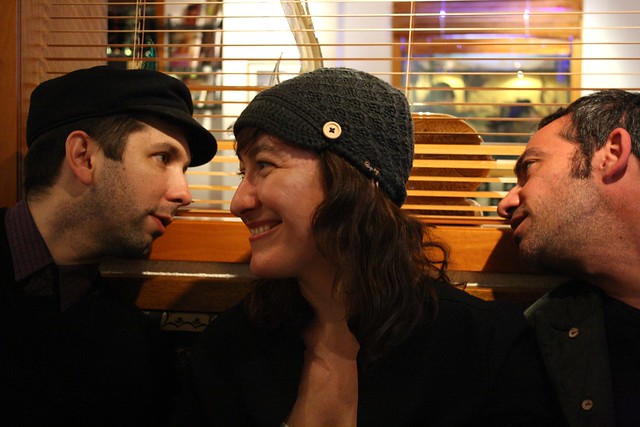By Ray Pride Pride@moviecitynews.com
Review: ATTENBERG, dir. Athina Rachel Tsangari
 Athina Rachel Tsangari’s weird and beautiful ATTENBERG—all-caps because the filmmaker says it “looks better”; it also looks more like Greek letterforms that way—is a moving marvel from modern Greece, with some of the most deliciously startling moments of any movie I saw in 2010. Tsangari, co-founder of Austin’s Cinematexas International Short Film Festival, debuted the film at Venice; it also played Toronto and Thessaloniki, where I saw it in December.
Athina Rachel Tsangari’s weird and beautiful ATTENBERG—all-caps because the filmmaker says it “looks better”; it also looks more like Greek letterforms that way—is a moving marvel from modern Greece, with some of the most deliciously startling moments of any movie I saw in 2010. Tsangari, co-founder of Austin’s Cinematexas International Short Film Festival, debuted the film at Venice; it also played Toronto and Thessaloniki, where I saw it in December.
Sales agent Match Factory’s elusive synopsis: “Marina [Ariane Labed], 23, is growing up with her architect father in a prototype factory town by the sea. Finding the human species strange and repellent, she keeps her distance. Instead she chooses to observe it through the songs of Suicide, the mammal documentaries of Sir David Attenborough, and the sexual-education lessons she receives from her only friend, Bella [Evangelia Randou]. A stranger [Yorgos Lanthimos, director of Dogtooth] comes to town and challenges her to a foosball duel, on her own table. Her father [Vangelis Mourikis] meanwhile ritualistically prepares for his exit from the 20th century, which he considers to be ‘overrated.’ Caught between the two men and her collaborator, Bella, Marina investigates the wondrous mystery of the human fauna.”
Labed took Best Actress prize at Venice, and her warmth inside a stylized, comic yet gloriously distanced movie, is the film’s true heart. The eccentric activities shared by architect father and still-unformed daughter, at the end of his life and a century shaped by his work in the small Greek village they live in, knit the disparate elements of Tsangari’s film together. They’re closest when they’re imitating the documentaries of Attenborough (who provides the title and has the first thank-you in the end credits). Marina hasn’t discovered kissing yet, at least not until a goofy and discomfiting opening scene of rampagingly clumsy face-suck, let alone sex and love. (There is a wealth of awkwardness to come.) “You’re a sea urchin, you won’t let anyone touch you,” Bella tells her. “Marina is not afraid of human contact, she is just repelled by it,” Tsangari told OZON magazine for its December 2010 issue, “like for example we are repelled by a cockroach. She only goes on with it when she feels ready and actually makes the first step.”
Other strengths include the extremely specific, heightened sound design, as well as a song score that includes work by Suicide, even though 23-year-old Marina is told, “you’re too young to like Suicide.” (Double-entendre present and accounted for.) A scene of deathbed mourning, accompanied by Suicide’s song “BeBop Kid,” is stark, simple, and surprisingly emotional. It’s a sustained take with strong horizontal elements, hospital room dim, shadows of brown, almost black, and the music plays, a character dances. Pow. Death, meet Suicide. The asperity of Alan Vega‘s spare post-punk pop matches the calculated austerity of Tsangari’s pictorial style.
While ATTENBERG is more gestural than dialogue-driven, the father has a speech about the failure of modern Greece that is as piercing and pungent as anything you hear on the streets of that country in its current economic straits. The father speaks of the now-barren factory town, the film’s setting, that he had helped design, of “the piston” and the sea, of industry and alienation. He describes Greece as a country that missed the industrial revolution, a populace that went from being shepherds to being petit-bourgeois strivers. It’s the rare scene that punches for the nose rather than lovingly constructed uncertainty. But the punch lands, forcefully.
Here’s a measure of the myriad ambiguities of the film: Tsangari, in an extended interview in Cinema Scope 45, interprets her movie differently. For instance, the passages that seem like a provocative use of movement, as in many moments in Dogtooth, which she co-produced. “People call what they’re doing dance, but we call it silly walks. The two girls had to create their own code of behavior and movement in this place where they’re outsiders. I like it when characters become ridiculous or self-mocking, so we started by doing penguin walks or whatever came through our heads, but because we all love Monty Python we moved on to that, started copying them, and then improvised variations. The idea was that they would frustrate the drama on purpose. It’s like in Greek tragedy—you have the chorus, which is simply moving across the stage chanting, as a commentary on the plot and then you continue. Each silly walk if you notice is a commentary on the plot. Initially, I thought the film would be structured as a Western, but with interludes as a musical. To me, we had a typical story of a Western: two main heroes in a small remote town, and then a stranger comes to town and changes the equilibrium. There is a showdown, someone dies, life goes on, but it doesn’t. That idea was a structural tool for me more than anything. It helps me, working with genre as a template and then stripping it down. I don’t separate form from content. To me they’re inseparable: Siamese twins not separated at birth. So ATTENBERG was meant to be Western + science fiction + screwball comedy + Greek tragedy. It’s also none of these things, of course. But I used these various genres’ ‘genetic’ codes to keep me in line with archetypal narrative structures, and rescue myself from naturalism.” To which I can only say, sure, yes, that also obtains. The Greek trailer, which is beautiful in its own right as a short cut to Alan Vega’s pulse (with brief nudity) is here. [Tsangari, center below, between filmmakers Mike Ott and Rafi Pitts. Photo © 2011 Ray Pride.] 















